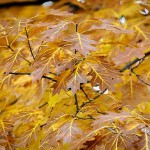Format Link
UW Hospital and Clinics honored for reducing infection
University of Wisconsin Hospital and Clinics was recognized for taking a major step forward in reducing health care-associated infection, as it received the 2013 Partnership in Prevention Award.
Munich institute honors Haveman for service
Germany’s leading economic research organization, the Ifo Institute in Munich, honored Professor Robert Haveman with a rare recognition, making him an honorary member.
Dairy science in spotlight as field advances
Dairy science is no longer the field of straw hats and bib overalls. The UW’s future is as thoroughly milk-soaked as its past.
Connection found between nitrogen levels in water and toxic algae production
Scientists have long known that phosphorus fuels growth of algae in lakes and streams. Wisconsin Sea Grant researchers have found that nitrogen levels are a factor in whether or not these algae – specifically, blue-green algae –produce toxins. The findings, published in PLOS ONE have parts of the scientific community buzzing.
Slideshow: Goodbye to fall
As the northern wind blows and the last oak tree leaves on Bascom Hill begin to fall, we bid adieu to autumn's golden moment. It's been a glorious season to behold.
SoE hosting range of American Education Week events, resources
American Education Week (Nov. 18 to 22) is an opportune time for UW–Madison’s School of Education to lend a hand in guiding its range of partners through this sometimes difficult terrain and into a future in which every child has access to a free, high-quality public education.
Teach-in to help “Young Invincibles” select health insurance options
A teach-in on new health insurance options is designed to send students home for Thanksgiving with important information to discuss with their families.
Lead exposure dooms some Wisconsin kids to struggle in school
Two studies funded by the Wisconsin Partnership Program paint a grim reality for Wisconsin children exposed to lead before age 3.
Focus on place motivates conservation behavior in faith-based communities
A new study published in the Journal for Religion, Nature and Culture explores how religion can play a positive role in encouraging conservation behavior. (Featured: Bret Shaw.)
International Education Week events showcase UW–Madison’s global tradition
The University of Wisconsin–Madison has a long, distinguished history of international engagement and producing globally talented graduates who create better lives for people in the state and around the world. International Education Week, November 11-15, will provide an opportunity to highlight and celebrate the university community’s ongoing commitment to that tradition.
Mackie’s goal: use what we’ve learned to help humanity
The Wisconsin Institute for Discovery's monthly Tools for Discovery profile features Rock Mackie, director of the medical devices research group at the Morgridge Institute for Research.
First-year student remembered for love of music, nature
Cassidy Fritsch came to UW–Madison with a track record of academic success and a readiness to get involved. In just over six weeks on campus, she had already joined several organizations that spoke to her concern about the natural world: the Veterinary Science Club and the GreenHouse Residential Learning Community.
Standing up to Socrates: Philosophy major invites more women to the table
When Macy Salzberger joined the Socratic Society, an undergraduate club for University of Wisconsin–Madison students interested in discussing philosophy, she was hoping to find like-minded friends eager to engage with her on complex topics: contemporary ethics, the nature of consciousness, and more. What she found, instead, was a fierce style of argument—and hardly any women.
Exhibiting signs of life
What if you could travel back in time 3 billion years, and take a breath? What would earth’s air smell like? Deeply stinky, according to Brooke Norsted, an outreach specialist for the University of Wisconsin–Madison Geology Museum.
New database allows custom comparisons of city finances
As Detroit faces bankruptcy and other U.S. cities address an ongoing crisis in municipal finance, a new interactive database allows for the first time meaningful comparisons of city finances — from spending on schools, police, and public works to revenues from the property tax and other sources.



